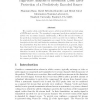Free Online Productivity Tools
i2Speak
i2Symbol
i2OCR
iTex2Img
iWeb2Print
iWeb2Shot
i2Type
iPdf2Split
iPdf2Merge
i2Bopomofo
i2Arabic
i2Style
i2Image
i2PDF
iLatex2Rtf
Sci2ools
DCC
2007
IEEE
2007
IEEE
High-Rate Analysis of Systematic Lossy Error Protection of a Predictively Encoded Source
We consider a first-order Markov source, which is predictively encoded using a DPCM-style encoder. The quantized compressed prediction residual is transmitted over an erasure channel. Additionally, a Wyner-Ziv encoded version of the prediction residual is transmitted in order to provide error resilience. When the symbols from the first transmission are erased by the channel, this second description is decoded, and limits the maximum distortion that can occur. Since the quantization step size used in the second description is, in general, larger than that used in the main transmission, error protection is lossy. Using highrate quantization theory, we derive expressions for the rate and the end-to-end distortion incurred by this system. We show that, compared to conventional lossless forward error correction, this lossy error protection scheme is robust in the sense that it allows the received signal quality to degrade gracefully when the erasure probability increases.
Compressed Prediction Residual | Computer Graphics | DCC 2007 | Lossless Forward Error | Lossy Error Protection |
| Added | 25 Dec 2009 |
| Updated | 25 Dec 2009 |
| Type | Conference |
| Year | 2007 |
| Where | DCC |
| Authors | Shantanu Rane, David Rebollo-Monedero, Bernd Girod |
Comments (0)

